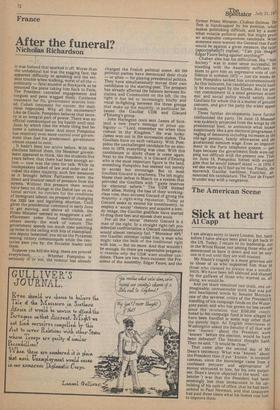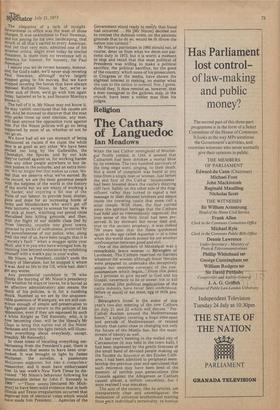The American Scene
Sick at heart
Al Capp
1 am always sorry to leave London, but, heretofore I have always been glad to get back to the US. Today, I return to no leadership, not in the White House, nor among those who are determined to burn it down and not let anyone in it out until they are well roasted.
Mr Nixon's tragedy is a more grievous one to those of us who supported him than to those who claimed he always was a sonofabitch. We have been left silenced and shamed by the guffaws of those who warned us, all along, we would be.
And yet there remained one truth, one unimaginable, unreasonable truth that was put into bewildered words by Senator Montoya, one of the severest critics of the President's handling of his campaign funds on the Watergate panel, and who has grown no less severe since the revelation that $100,000 contributed to his campaign fund is now alleged to have been handled in some way other than the strictly legal. An English interviewer in Washington asked the Senator if all that was now 'known' about the President were ' known' before the election, would he have been defeated? The Senator thought hard. Then he said, "it would be close."
That came after the second day of Mr Dean's testimony. What was ' known ' about the President then (I put ' known 'in inverted commas, since the knowledge came from a confessed perjurer and appropriator of money entrusted to him, for his own purposes; Dean's lawyer objected to the word ' embezzler ') was that the President had been seemingly less than immaculate in his upholding of his oath of office, that he had been unkind to Paul Newman, and that taxpayers had paid three times what his homes cost him to improve them. The allegation of a lack of straightforwardness in office was the least of those Charges. It was unkindness to Paul Newman, and not paying for his own landscaping, that struck at all that's sacred to every American. And yet that very man, admitted one of his severest critics, might even today be elected President. Is there then no reverence left in America for honour, for honesty, for Paul Newman?
I assure you we do revere honesty, honour, and, for God's sake, we'll never stop revering
Paul Newman, although*" we've largely stopped going to his movies. But we have stopped revering the forces that have always
0PPosed Richard Nixon. In fact, we're so damn sick of them, we'd go with him again today, battered as he is, and Senator Montoya knows it.
The hell of it is, Mr Nixon may not know it. He may vanish convinced that his causes are lost, And be stunned to discover that the man Who picks them up next election, any man, Will beat anyone the opposition runs against him. For the Nixon policies will go on being supported by most of us, whether or not he can go on. We have had all we can stomach of being denounced as racists if we claim the white race is as good as any other. We have been reviled too long by the Galbraiths, the Chomskys, the Spocks, and by our kids
they've turned against us, for working harder than any other people anywhere to buy decent homes in the suburbs, and an extra minicar. We no longer feel that makes us crass. We
feel that we deserve what we've earned. By the record, we are the most generous people With the helpless of the world in the history
of the world but we are weary of working a bit harder, and enjoying a bit less of the
fruits of our labour, to provide food, shelter, guns and dope for an increasing horde of bums and bloodsuckers who won't get off their bottoms, except to scream for more. We are sick at heart, watching our proud cities liberalised into killing grounds, and then, With the flight of our middle class (led by those liberals), crumble into ghost towns, Prowled by packs of subhumans, protected by the powerlessness of our police, who, along With the rest of us, have been taught that it is society's fault" when a mugger splits your Skull, and it is you who have wronged him, by taunting him beyond endurance by exhibiting Yourself with a week's pay in your wallet.
Mr Nixon, as President, couldn't undo the lunacy of liberalism, but he stopped it where it was. And so life in the US, while bad, didn't get any worse.
Any presidential candidate in '76 who thinks the burying of Mr Nixon's presidency for whether he stays or leaves, he is buried as an effective administrator) also means the
death of his policies, is in for a numbing Shock. Numbed as we are by the unanswerable questions of Watergate, we are still con sFious enough of simple self-preservation to fight against any return to the policies of his oPposition, even if they are espoused by such
a white Knight as Ted Kennedy, who, it is
now becoming clear, will be the liberal's Mr Clean to bring this nation out of the Nixon darkness and into the light (which will illuminate everything about everybody, except, Possibly, Mr Kennedy).
In these times of recalling everything embarrassing from the President's past, there is one incident that seems to have been over looked. It was brought to light by James Michener, the _ novelist, a passionate McGovern supporter, but also a compulsive, researcher, and it must have embarrassed him. In last week's New York Times he dis
cussed "Mr Nixon's behaviour following his questionable defeat by John F. Kennedy in
1960" There seems [declared Mr Mich
ener] to have been solid evidence that in both Illinois and Texas irregularities occurred that deprived him of electoral votes which would have made him President ... Agencies of the Government stood ready to tesiify that fraud had occurred ... He [Mr Nixon] decided not to contest the dubious votes, on the patriotic grounds that to do so, would be th throw the nation into turmoil."
Mr Nixon's patriotism in 1960 should not, of course, deter us from what we deem our patriotic duty in 1973, but it is worth a moment to stop and recall that this most political of Presidents was willing to make a political sacrifice, the political sacrifice, for the good of the country, which none of his prosecutors, in Congress or the media, have shown the slightest interest in making, no matter what the cost to the nation in turmoil. Nor, I guess, should they. It does remind us, however, that 'a man consigned to the gallows, may, in the crunch, have been a nobler man than his judges.































 Previous page
Previous page